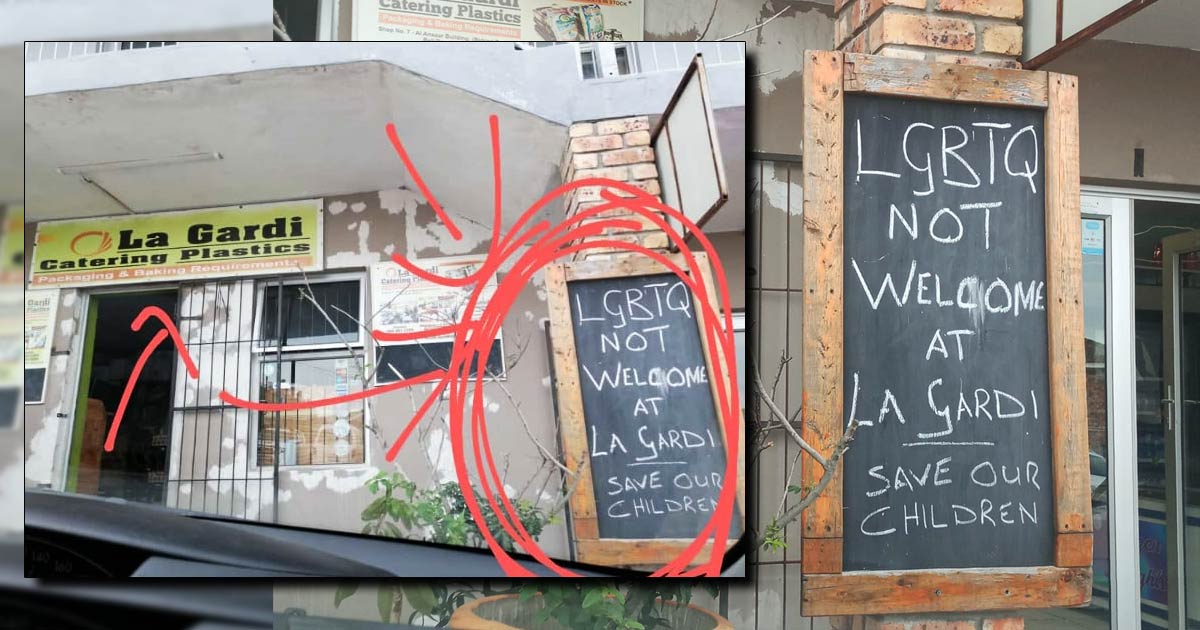Equality Court: Gqeberha Store Defends LGBTQ+ Ban as “Religious Freedom”

The hateful July 2023 sign outside the La Gardi store in Gqeberha, South Africa is the subject of an Equality Court case (Photo: Jayda Van Heerden / Facebook)
The discrimination case against the owner of a Gqeberha store that “banned” LGBTQ+ people was heard in the Equality Court on Monday.
In July 2023, the La Gardi packaging, spice, dairy, and baking shop sparked a furore after it erected a sign proclaiming: “LGBTQ not welcome at La Gardi – Save our Children.”
Its homophobic owner, Dawood Lagardien, is also accused of managing a WhatsApp group, named “Our rights – anti-LGBTQ+”. It attracted over 600 members, many of whom published anti-LGBTQ+ slurs and other hate speech. Some individuals posted statements inciting violence against LGBTQ+ people.
Lagardien told MambaOnline at the time that LGBTQ+ people are being “forced down our throat”. He asserted: “I will not allow LGBTQ individuals in my shop, and no one can stop me!”
Following several complaints, the SA Human Rights Commission (SAHRC) instituted proceedings against Lagardien in the High Court, sitting as an Equality Court, in Gqeberha.
The commission alleges that the shop owner violated the Promotion of Equality and Prevention of Unfair Discrimination Act (PEPUDA or the Equality Act) by discriminating against the LGBTQ+ community. It is demanding that he issue a public apology and pay R500,000 in damages to an NGO dedicated to promoting equality.
Shop Owner Wanted to “Protect Children”
A defiant Lagardien states in court documents that as a practising Muslim who views same-sex relationships as “un-Islamic and amoral,” he is “obliged to take steps to prevent children from being exposed to… amoral behaviours.” Lagardien also asserts that the sign was an “expression of his religious beliefs.”
He claims that he was moved to put up the sign after two gay men visited his store in June 2023 and allegedly kissed one another, and touched each other’s genitals in front of other customers, including children. After he asked the men to leave the store, he further claims that he and his family faced “acts of intimidation and threats of violence.”
Lagardien argues that the SAHRC has no evidence that he actually denied services to members of the LGBTQ+ community and that if he did discriminate by putting up the sign, it was not “unfair” discrimination as it sought to protect customers and children from conduct “against their Islamic beliefs.”
(It’s worth noting that if Lagardien had erected a sign prohibiting displays of intimacy in his shop between all couples, both same-sex and opposite-sex, he would likely not be facing legal action.)
The shop owner goes on to contend that the sign is protected under his right to freedom of speech, and that while it might have been offensive, it did not incite hate and was not harmful or did not incite harm. He further insists that the sign is protected under his constitutional right to freedom of religion.
Religion Not The Supreme Law of the Republic
In its response, the SAHRC seeks to separate Lagardien’s religious beliefs from his actions. It points out that Islam, or any other religion, “is not a license for the respondent to infringe on other people’s rights.”
It also notes that Islam is not the supreme law of the republic and that the Constitutional Court has held that certain basic norms and standards are binding to all South Africans regardless of religion.
“The respondent is intentionally fusing the offending conduct with his religious rights so that this Court may not grant the relief sought on the basis that it would be an infringement of his right to religion. This should not be allowed,” argues the commission.
It notes that “the words used by the sign and the message communicated by the sign propagate hatred against the LGBTQI community” and that this also “constituted harassment of the LGBTQI community.”
The commission quotes some of the WhatsApp group’s messages, one of which calls for “crush[ing] these evil vermin.” According to the SAHRC: “the respondent has gone further than expressing a religious dogma. He and his accomplices have called for the annihilation of others using religion as an excuse.”
In Monday’s hearing, Media Monitoring Africa successfully applied to intervene in the matter as an amicus curiae (friend of the court). The Commission for Gender Equality (CGE) also expressed its intention to apply as amicus curiae and was given 30 days to submit its application to the Equality Court.
The matter was postponed to August 2024 with a specific date to be confirmed.
Leave a Reply